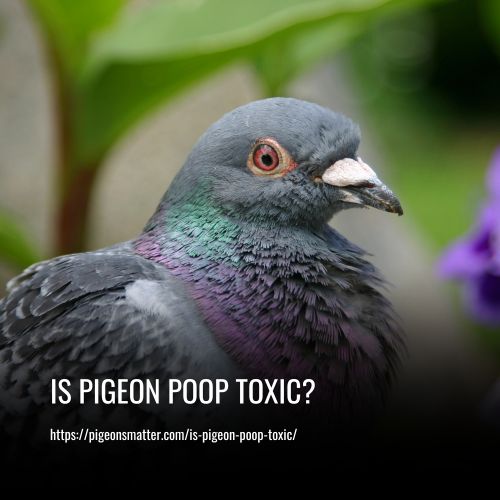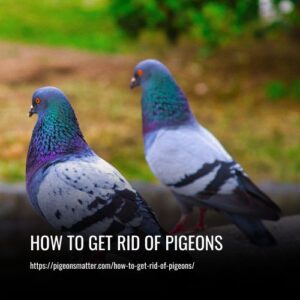Yes, pigeon poop can be toxic due to the potential transmission of diseases through contact with their droppings. These diseases include:
- Histoplasmosis.
- Cryptococcosis.
- Psittacosis.

1. Histoplasmosis:
- This fungal infection is caused by inhaling spores from Pigeon droppings.
- Symptoms may range from mild respiratory issues to severe lung infections.
- Individuals with compromised immune systems are particularly vulnerable.
2. Cryptococcosis:
- Another fungal infection that can be contracted by inhaling dried pigeon droppings.
- It primarily affects the respiratory system but can spread to other body parts, including the brain.
3. Psittacosis:
- Although more commonly associated with parrots, pigeons can also carry the bacteria responsible for Psittacosis.
- This illness can lead to pneumonia-like symptoms, such as fever, cough, and difficulty breathing.
While the risk of contracting these diseases is relatively low, taking precautions when dealing with pigeon poop is essential, especially for individuals with compromised immune systems or respiratory issues.
What Does Pigeon Poop Look Like?
Pigeon droppings are a common sight in urban areas where these birds are prevalent. These droppings are white-brown in hue and resemble small marbles in texture and size. It’s essential to note that healthy pigeons will have a few feathers in their feces, while sick or anxious birds may display loose and watery droppings.
Bird droppings can carry harmful pathogens, including bacteria and fungi, which can cause various health issues. Therefore, identifying a sick pigeon through its dropping can help prevent the spread of infectious diseases to other birds or humans.
It’s worth mentioning that while pigeon droppings may look harmless, they can cause damage to buildings and other structures over time. Pigeon droppings can corrode and stain surfaces, and their acidic nature can pose a threat to roofing materials and cause water damage.
Is Pigeon Poop Harmful?
Pigeon droppings are more than just an eyesore, as they can cause significant damage to buildings over time due to their highly acidic nature. Besides, if the accumulation is left unchecked, the excreta from these pests can cause floors or roofs to collapse, making homes unsafe for habitation. Furthermore, extensive droppings can contaminate food intended for both human and livestock consumption, posing a significant health risk to those who come into contact with it.
Pigeon droppings can also introduce a host of parasites, ticks, and other pathogens into their surrounding environments that may result in various diseases, making them a cause for concern for people living near high-rise buildings or apartment complexes. Pigeons’ unique mode of excreting nitrogenous waste — via uric acid in their droppings — makes it a respiratory irritant in humans, causing respiratory problems and discomfort.
People cleaning up after pigeons need to take specific precautions to avoid inhaling the dust caused by their droppings. Protective clothing, including a mask and goggles, is advisable when cleaning up their droppings, as inhalation of the dust and debris may cause various diseases like psittacosis, cryptococcosis, and histoplasmosis.
How Dangerous Are Pigeon Droppings To Your Health?
Pigeon droppings are not only unsightly but also highly hazardous to human health. These birds are known carriers of many diseases and parasites that can ultimately end up in their droppings. If you have a pigeon infestation on your property, the chances of contracting an illness from their droppings become very high. It is essential to take quick and effective measures to handle the problem and eliminate the risk of illness.
Contracting diseases and parasites from pigeon droppings is a real concern. Pigeons can carry more than sixty diseases and twenty ectoparasites that can cause various health problems in humans. The droppings, feathers, and other debris from infested roosting sites become breeding grounds for bacteria, fungi, and viruses, which all increase the risk of illness in humans.
There are two possible outcomes of living with pigeons on your property, both of which pose a substantial health risk. Firstly, pigeon droppings will accumulate on your roof or property, and over time, the acidic droppings can wreak havoc on your property, causing substantial damage to roofing materials and solar panels. The second possibility is that the waste will eventually be tracked into your home, exposing everyone to the diseases, parasites, and contaminated air that come with it.
Health Risks
Pigeon droppings are not only unsightly but also highly hazardous to human health, with birds carrying over 60 diseases and parasites, many of which can cause severe illness. Those who come in direct contact with bird droppings are at risk of potential health hazards. It is also advised that people with lung or other health conditions should avoid dried bird droppings as much as possible.
When dried Pigeon droppings are disrupted and become airborne, the resulting particles can irritate the bronchial passage, causing respiratory disease. Moreover, disturbing large quantities of dried bird poop can lead to the transmission of fungal diseases such as Histoplasmosis or Cryptococcosis. These diseases are caused by fungal spores within the poop and can even contaminate soil that is overexposed.
Those who are most at risk are vulnerable people with pre-existing lung or immune system conditions, who should avoid situations where dried bird droppings may be aerosolized and stay clear of excavation, construction, or demolition work where large quantities of bird poop may be disturbed and cause potential health risks.
What are the Diseases and Who is at Risk?
Exposure to pigeon droppings can carry health risks, and two of the main diseases associated with this exposure are psittacosis and salmonella. Psittacosis is caused by bacteria found in both wild and domesticated birds and can result in pneumonia, while salmonella leads to an upset stomach and diarrhea. Although rare, both illnesses can be contracted through contact with pigeon droppings.
Dust particles containing the bacteria can get into the air when droppings and respiratory secretions dry out. Therefore, both sick birds and healthy birds can carry and spread the bacteria, putting anyone who comes in contact with contaminated areas at risk for infection.
People who are especially vulnerable to these diseases due to preexisting medical conditions should avoid tasks involving bird droppings. Workers with a weakened immune system are particularly advised by the UK Health and Safety Executive to avoid directly handling tasks involving bird droppings.
Are there any other risks?
Breathing in dust or water droplets that contain contaminated Pigeon droppings can lead to various diseases, including psittacosis and salmonella. Psittacosis, resulting from Chlamydia psittaci bacteria, commonly manifests as a flu-like illness that leads to pneumonia within five to 19 days of exposure. Salmonella, a bacterial infection that typically causes diarrhea, can also be present in some Pigeon droppings.
Individuals with compromised immune systems, such as those with HIV/AIDS or cancer, are particularly vulnerable to these diseases and hence should not engage in cleaning up droppings. Besides, Histoplasmosis and Cryptococcosis are other infections that individuals can contract from inhaling fungus found in bird droppings.
It is strongly advised to wash your hands thoroughly after cleaning up Pigeon droppings to prevent the spread of infections and viruses. Given the high risks associated with cleaning droppings, it is important to take precautionary measures such as using gloves and protective clothing.
Preventing the Spread of Disease
To prevent the spread of airborne diseases such as psittacosis and salmonella from Pigeon droppings, cleaning professionals must take necessary precautions. The HSE recommends using its ‘Assess, Control and Review’ model to limit exposure to pigeon droppings. During the assessment phase, cleaning professionals should identify and assess their level of risk and devise a plan to mitigate any potential hazards. They should also consider involving their colleagues in the planning process.
In the second phase, cleaning professionals should take measures to prevent and control further health risks to themselves. This may include wearing protective gear such as gloves, masks, and goggles to avoid direct contact with the droppings. It is also recommended to wet down the droppings to minimize the chances of dust becoming airborne. Additionally, bird spikes can be used as a deterrent to prevent pigeons from roosting in the area.
However, if the infestation is severe, it is advisable to seek professional help to deal with the issue. Cleaning professionals may also consider providing training to their colleagues to raise awareness of the potential health hazards posed by Pigeon droppings.
Finally, during the review phase of the ‘Assess, Control, and Review’ model, cleaning professionals should examine their procedures and processes to ensure their effectiveness in protecting themselves and their colleagues from the spread of disease.
Pigeons are a Health Hazard
Pigeons are recognized as carriers and transmitters of various diseases through their droppings. These diseases include Histoplasmosis, Pigeon Ornithosis, Salmonella, Cryptococcosis, Toxoplasmosis, and Encephalitis. Pigeons can also harbor many ectoparasites, including ticks, flies, fleas, mites, and biting lice, all of which can transmit diseases.
- Pigeon droppings pose a significant risk of making structural surfaces slippery and dangerous. Such hazards may even result in health claims and lawsuits that tend to exceed 100K.
- The collections of droppings also provide an environment for bacterial and fungal growth. This growth may, in turn, prove a potential public health problem and cause respiratory infections and other infectious diseases.
- Human diseases that have been linked to pigeon droppings include Histoplasmosis, Cryptococcosis, Psittacosis, and Toxoplasmosis. Additionally, the nesting material of pigeons may also harbor fabric pests or pantry pests.
- Besides, pigeon droppings might also result in damage to buildings and other structures. This damage can be very costly to repair and may even pose safety risks. Therefore, pigeon control and abatement services are essential to reduce potential health risks and safeguard your property.
Steps for Safe Removal of Pigeon Droppings:
If the droppings are dry, break them up with your hands. If the droppings are wet, use a vac cleaner with a hose attachment.
- Personal Protective Equipment (PPE): Wear gloves, goggles, a mask, and disposable coveralls to protect yourself from direct contact with pigeon droppings and inhalation of harmful spores.
- Wet Cleaning: Avoid dry sweeping or vacuuming, as this can release airborne particles. Use a wet cleaning method by spraying the affected area with water to dampen the droppings and prevent them from becoming airborne.
- Disinfection: Thoroughly disinfect the area using a commercial-grade disinfectant to kill any remaining bacteria or fungi.
- Proper Disposal: Dispose of contaminated materials, cleaning supplies, and PPE as hazardous waste in accordance with local regulations.
- Ventilation: Ensure proper ventilation during and after cleanup to minimize the concentration of airborne particles. Use fans or open windows to improve air circulation if working indoors.
- Hand Hygiene: Wash your hands thoroughly with soap and water after completing the cleanup to prevent the spread of potential contaminants.
FAQs
Pigeon poop can carry various pathogens, including bacteria, fungi, and parasites, which may pose health risks to humans. Histoplasmosis and Cryptococcosis are two common diseases associated with exposure to pigeon droppings.
Inhaling dried pigeon droppings or dust containing particles from their droppings can lead to respiratory issues or infections. Histoplasmosis, particularly, can cause flu-like symptoms when the spores are inhaled.
While cleaning up small amounts of pigeon poop may not be overly hazardous, it’s essential to take precautions. Wear protective gear such as gloves, a mask, and goggles to avoid direct contact and inhalation of particles.
Use water and mild detergent to wet the affected area before cleaning to prevent the release of airborne particles. Then, carefully scrape off the poop, bag it, and dispose of it properly. Disinfect the area afterward.
Yes, pigeon droppings can cause damage to buildings and structures. The uric acid in the droppings can corrode metal and deteriorate various building materials over time, leading to structural issues and damage.
Yes, several measures can deter pigeons from nesting, including using physical barriers like netting, spikes, or wire mesh. Additionally, removing food sources, sealing entry points, and keeping areas clean can discourage pigeons from frequenting your property.
Conclusion:
This article provides essential information on the potential health risks associated with pigeon poop, including bacterial and fungal infections, respiratory diseases, and food poisoning. By understanding these risks, readers can take necessary precautions to protect themselves from exposure to pigeon droppings. The article also offers helpful tips on the safe removal of Pigeon droppings and selecting the appropriate bird deterrent materials for your premises.
By following these recommendations, individuals can prevent future Pigeon infestations and minimize damage to buildings and surfaces caused by pigeon droppings. Overall, this article serves as a valuable resource for anyone concerned about the potential health hazards posed by pigeon poop.


